 To enhance service speed and avoid tariff delays, we've opened a US warehouse. All US orders ship directly from our US facility.
To enhance service speed and avoid tariff delays, we've opened a US warehouse. All US orders ship directly from our US facility.
| Cat. No. | Product Name | Field of Application | Chemical Structure |
|---|---|---|---|
| DC31792 | Oxiconazole Featured |
Oxiconazole is an antifungal medication typically administered in a cream or lotion to treat skin infections, such as athlete's foot, jock itch and ringworm. It can also be prescribed to treat the skin rash known as tinea versicolor, caused by systemic yeast overgrowth (Candida spp.).
More description
|
|
| DC39082 | BCH001 Featured |
BCH001 is a specific PAPD5 inhibitor that restores telomerase activity and telomere length in dyskeratosis congenita (DC) patient induced pluripotent stem cells. PAPD5 is a noncanonical poly(A) polymerase with an unusual RNA-binding motif.
More description
|

|
| DC28161 | ARP-100 Featured |
ARP-100 is a potent and selective matrix metalloproteinase MMP-2 inhibitor (IC50=12 nM). ARP-100 interacts with S1' pocket of MMP-2 and shows anti-invasive properties in an in vitro model of invasion on matrigel. ARP-100 shows the less inhibitory activity towards MMP-1 (>50 μM), MMP-3 (4.5 μM), MMP-7 (>50 μM), and MMP-9 (0.2 μM).
More description
|

|
| DC20347 | Crebinostat Featured |
Crebinostat is a novel cognitive enhancer that inhibits class I HDAC/1/2/3 (IC50=0.7/1.0/2.0 nM), class IIb HDAC6 (IC50=9.3 nM) with weaker inhibition of the class I HDAC8 and no significant inhibition of the class IIa HDAC/4/5/7/9; potently induces acetylation of both histone H3 and histone H4 as well as enhanced the expression of the CREB target gene Egr1 in cultured mouse primary neurons; upregulates Bdnf and Grn, and downregulates Mapt (tau) gene expression-genes; brain penetrant.
More description
|

|
| DC46393 | JNJ-67856633 Featured |
JNJ-67856633 is an orally active, first-in-class, potent, selective and allosteric MALT1 protease inhibitor. JNJ-67856633 in some cases lead to tumor stasis.
More description
|

|
| DC33645 | TBK1/IKKε-IN-5 Featured |
QUN97653, also known as TBK1/IKKε-IN-5, is a dual TBK1 and IKKε inhibitor, with IC50 values of 1 nM and 5.6 nM for TBK1 and IKKε, respectively. QUN97653 was first reported in patent WO 2016049211. It has CAS#1893397-65-3 without code name. For the convenience of scientific communication, we temporally name it as QUN97653, which was based on Hodoodo Chemical Nomenclature (https://hodoodo.com/hodoodo-chemical-nomenclature).
More description
|
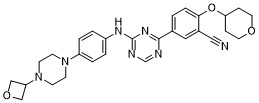
|
| DC28480 | Urolithin B Featured |
Urolithin B is one of the gut microbial metabolites of ellagitannins, and has anti-inflammatory and antioxidant effects. Urolithin B inhibits NF-κB activity by reducing the phosphorylation and degradation of IκBα, and suppresses the phosphorylation of JNK, ERK, and Akt, and enhances the phosphorylation of AMPK. Urolithin B is also a regulator of skeletal muscle mass.
More description
|

|
| DC11729 | GNE-781 Featured |
GNE-781 is a potent, selective, non-CNS penetrant, orally active CBP/p300 bromodomain inhibitor with IC50 of 0.94/1.2 nM in TR-FRET assays.
More description
|
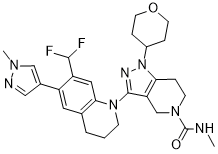
|
| DC46183 | TPX-0022(CSF1R-IN-2) Featured |
TPX-0022 (CSF1R-IN-2) is a potent inhibitor of MET/CSF1R/SRC with enzymatic kinase inhibition IC50s of 0.14 nM, 0.71 nM and 0.12 nM, respectively. TPX-0022 modulates the tumor immune microenvironment in preclinical models.
More description
|

|
| DC20788 | BIBO-3304 Featured |
BIBO 3304 is a potent, selective, nonpeptide neuropeptide Y Y1 receptor antagonist with IC50 of 0.38 and 0.72 nM for human and the rat Y1 receptor, respectively.
More description
|
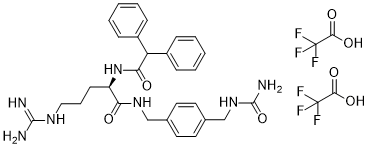
|
| DC21665 | PFM01 Featured |
PFM01 (SML1735) is a small molecule that specifically inhibits endonuclease, but not exonuclease activity of MRE11, inhibits dsDNA end resection in A549 cells with IC50 of 50-75 uM, blocks the ssDNA-binding path toward the catalytic metal ions and disrupt
More description
|

|
| DC45551 | LY3405105 Featured |
LY3405105 is an orally active CDK7 inhibitor with an IC50 of 92.8 nM. LY3405105 shows potential antineoplastic activity.
More description
|

|
| DC45278 | Colivelin Featured |
Colivelin is a brain penetrant neuroprotective peptide and a potent activator of STAT3, suppresses neuronal death by activating STAT3 in vitro. Colivelin exhibits long-term beneficial effects against neurotoxicity, Aβ deposition, neuronal apoptosis, and synaptic plasticity deficits in neurodegenerative disease. Colivelin has the potential for the treatment of alzheimer's disease and ischemic brain injury
More description
|

|
| DC21573 | Ro 5212773 Featured |
EPPTB is a selective antagonist of the trace amine-associated receptor 1 (TAAR1).
More description
|

|
| DC20528 | RAD51-IN-1 Featured |
RAD51-IN-17 is a quinazolinone derivative that inhibts homologous recombinase RAD51, effectively inhibits both RAD51 foci formation in response to DNA damage, and proliferation of TNBC cell lines.
More description
|
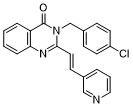
|
| DC11258 | IITZ-01 Featured |
IITZ-01 is a novel potent lysosomotropic autophagy inhibitor, has single-agent antitumor efficacy in triple-negative breast cancer in vitro and in vivo.
More description
|

|
| DC46193 | BRM/BRG1 ATP Inhibitor-1 Featured |
BRM/BRG1 ATP Inhibitor-1 is an orally active inhibitors of Brahma Homolog (BRM)/SMARCA2 with IC50 below 0.005 µM.
More description
|

|
| DC23924 | N-Acetyl-Calicheamicin Featured |
N-Acetyl-Calicheamicin is a enediyne antitumor antibiotic.
More description
|

|
| DC45577 | Norbergenin Featured |
Norbergenin, the O-demethyl derivative of bergenin, shows moderate antioxidant activity (IC50 13 μM in DPPH radical scavenging; 32 μM in superoxide anion scavenging).
More description
|
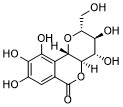
|
| DC40209 | ZUN97585(FGFR1/DDR2 inhibitor 1) Featured |
FGFR1/DDR2 inhibitor 1 is an orally active inhibitor of fibroblast growth factor receptor 1 (FGFR1) and discoindin domain receptor 2 (DDR2), with IC50 values of 31.1 nM and 3.2 nM, respectively. Antitumor activity.
More description
|

|
| DC45087 | 11R-VIVIT Featured |
11R-VIVIT is a potent NFAT inhibitor. 11R-VIVIT inhibits LPS or LPS plus IFN-γ-induced IL-12 p40, IL-12 p70, IL-23 and TNF secretion from bone marrow-derived macrophages (BMDMs). 11R-VIVIT also attenuates NO production and Nos2 mRNA expression in LPS-stimulated BMDMs. 11R-VIVIT improves symptoms in a mouse model of colitis. Exhibits immunosuppressive effects; enhances graft survival in mice.
More description
|

|
| DC20473 | NEDD8 inhibitor M22 Featured |
NEDD8 inhibitor M22 is a novel, potent, selective reversible NEDD8 activating enzyme (NAE) inhibitor.
More description
|

|
| DC60074 | LVN84663 Featured |
LVN84663 is a useful reagent for determination of blood coagulating protease. It was first described in patent DE 3516579. LVN84663 has CAS#103784-66-3, no formal name. For the convenience of scientific communication, we named it as LVN84663 (combined from Inchi key plus CAS#) according to Hodoodo Chemical Nomenclature
More description
|

|
| DC60072 | MM-102 TFA Featured |
MM-102 is a Potent WDR5/MLL interaction inhibitor. The MM-102 compound prevents the interaction between mixed lineage leukemia 1 (MLL1) and WD Trp-Asp repeat domain 5 (WDR5) and results in the inhibition of MLL1 H3K4 histone methyltransferase (HMT) activity. Down-Regulation of H3K4me3 by MM-102 Facilitates Epigenetic Reprogramming of Porcine Somatic Cell Nuclear Transfer Embryos
More description
|
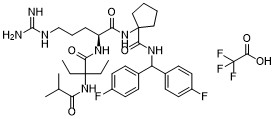
|
| DC42326 | Azumolene Featured |
Azumolene (EU4093 free base), a Dantrolene analog, is a muscle relaxant. Azumolene is a ryanodine receptor (RyR) modulator and inhibits the calcium-release through ryanodine receptor. Azumolene can be used for malignant hyperthermia research.
More description
|

|
| DC10907 | GNE-131 Featured |
GNE-131 is a novel NaV1.7 inhibitor with IC50 0.003uM,improving metabolic stability,efficacy in mouse IEM model at C-plasma <2.8uM.
More description
|

|
| DC43797 | GW280264X Featured |
Inhibitor of of the metalloproteinase ADAM17; Inhibitor of the constitutive and the PMA-inducible CX3CL1 cleavage, blocking TACE as well as ADAM10
More description
|
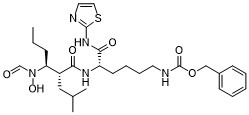
|
| DC21329 | MLS 0263839 Featured |
MLS 0263839 is a potent, specific inhibitor of the phosphatase PHOSPHO1 with IC50 of 0.14 uM, shows minimal cross-inhibition of TNAP and no inhibition of ENPP1 activity.
More description
|

|
| DC23765 | CPYPP Featured |
CPYPP is a small-molecule inhibitor of the Rac activator DOCK2 with IC50 of 22.8 uM (DOCK2DHR-2-mediated Rac GEF activity), inhibits DOCK2-Rac1 interaction.
More description
|

|
| DC10667 | Gea3162 Featured |
Gea 3162 is a potent inhibitor of ADP-induced platelet aggregation in platelet rich plasma (PRP). GEA 3162 stimulates cGMP production in platelets, granulocytes, and polymorphonuclear leukocytes.
More description
|
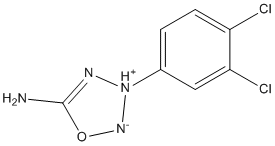
|